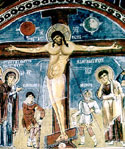Holy Friday

Matins of Holy Friday are generally celebrated on Thursday night. The main feature of this service is the reading of twelve selections from the Gospels, all of which are accounts of the passion of Christ. The first of these twelve readings is Jn 13.31–18.1. It is Christ’s long discourse with his apostles that ends with the so-called high priestly prayer. The final gospel tells of the sealing of the tomb and the setting of the watch (Mt 27.62–66).
The twelve Gospel readings of Christ’s passion are placed between the various parts of the service. The hymnology is all related to the sufferings of the Saviour and borrows heavily from the Gospels and the prophetic scriptures and psalms. The Lord’s beatitudes are added to the service after the sixth gospel reading, and there is special emphasis given to the salvation of the thief who acknowledged Christ’s Kingdom.

The Hours of Holy Friday repeat the Gospels of Christ’s passion with the addition at each Hour of readings from Old Testamental prophecies concerning man’s redemption, and from letters of Saint Paul relative to man’s salvation through the sufferings of Christ. The psalms used are also of a special prophetic character, e.g., Ps 2, 5, 22, 109, 139, et al.
There is no Divine Liturgy on Good Friday for the same obvious reason that forbids the celebration of the eucharist on the fasting days of lent (see “Lenten Fasting,” below).
